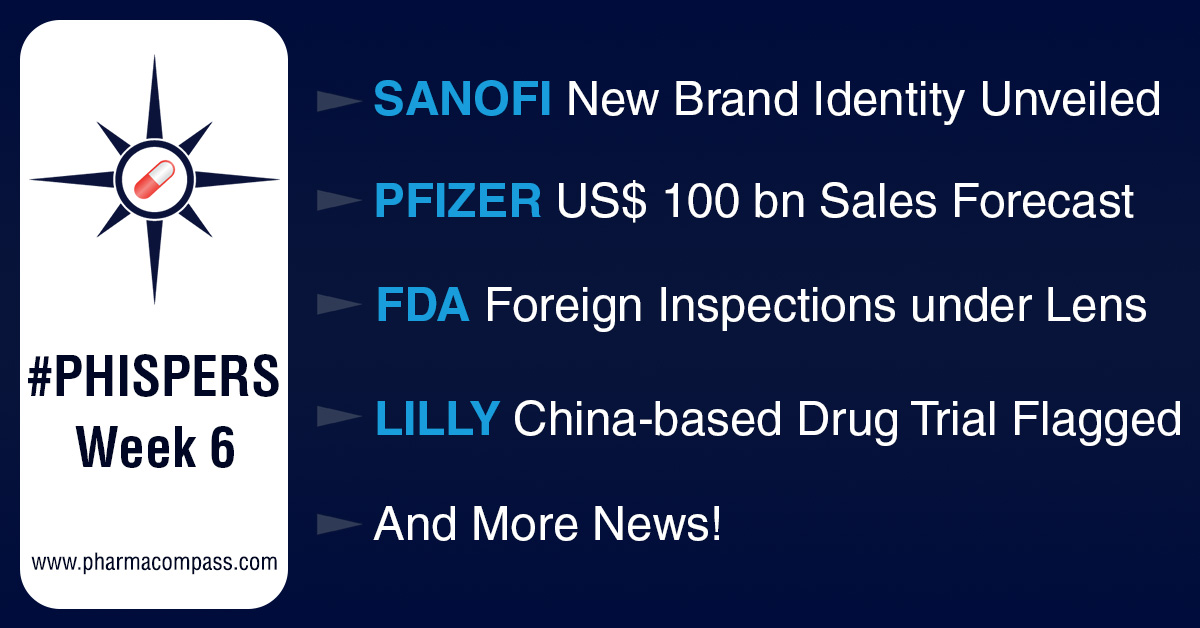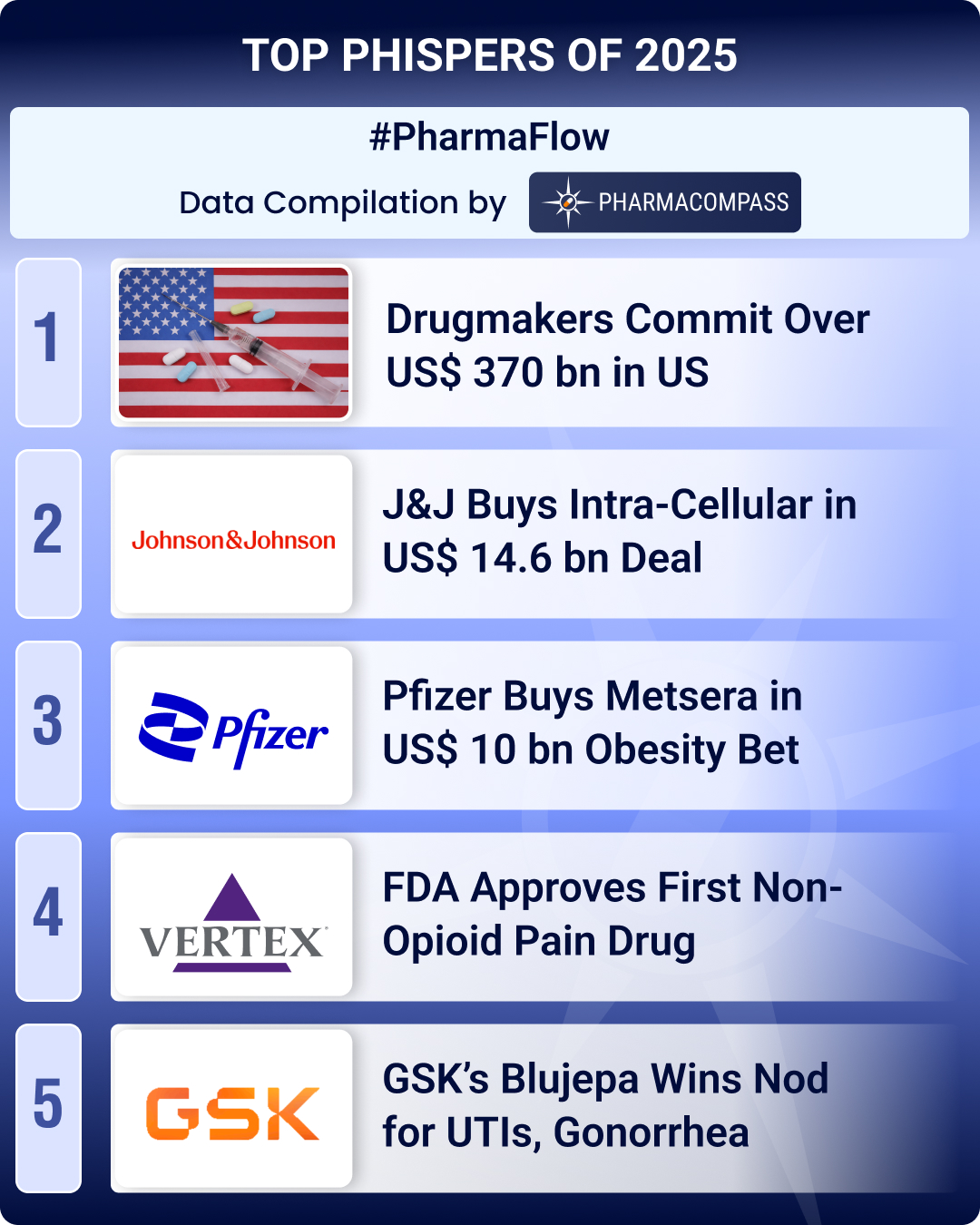
By PharmaCompass
2022-02-10
Impressions: 1606
This week’s Phispers brings you news about Sanofi’s new corporate brand and logo, Pfizer’s sales forecast for 2022, regulatory updates and other important news from the world of pharmaceuticals.
Sanofi has unveiled a new corporate brand and logo and united the sub-brands – Pasteur and Genzyme – under its main brand name.
Pfizer has forecast its 2022 revenue at US$ 98 billion to US$ 102 billion, with over half the revenue coming from the sales of its Covid-19 vaccine Comirnaty and antiviral pill Paxlovid. There is also news that Pfizer has charged two of its former employees of stealing trade secrets and using the stolen data to develop an obesity treatment and strike a US$ 1.5 billion deal with Eli Lilly.
A Government Accountability Office (GAO) report has pointed out inadequacies in the US Food and Drug Administration’s inspection of foreign drug manufacturing facilities. The agency resumed its domestic drug manufacturing inspections earlier this week, after a 41-day pause.
In other significant regulatory news, the FDA showed its unwillingness to approve Eli Lilly and its partner Innovent Biologics’ cancer treatment — Tyvyt — as the drug’s clinical data is solely from China. And Merck KGaA has announced plans to form a new Life Sciences Services unit by combining its existing contract development and manufacturing organization (CDMO) and contract testing units.
Sanofi unveils new corporate identity; ditches Genzyme, Pasteur brands
French pharmaceutical giant Sanofi rolled out a new corporate brand, logo and purpose last week, tying the company together under a single identity.
Under the changes, Sanofi's sub-brands, which include Sanofi Pasteur and Sanofi Genzyme, will be united under the Sanofi brand. Pasteur is Sanofi’s vaccines business unit and Genzyme is the specialty care business unit. Sanofi made these changes because it lost its stakeholders with its multiple names, said Josep Catllà, head of corporate affairs.
The drugmaker has also revealed a clean, new logo, written in lower case, with two purple dots at the start and end. The French drugmaker has also adopted a new purpose statement — “We chase the miracles of science to improve people’s lives.”
Meanwhile, Sanofi is continuing with its plans to slim down. This year, the drugmaker plans to cut down the number of employees by around 6,000 from the existing 96,000 as part of its massive cost saving effort, CFO Jean-Baptiste Chasseloup de Chatillon said. Part of the reduction in headcount includes the planned EUROAPI spin-off, which will employ 3,200 people.
Bags FDA approval for rare disease drug: A year after declining approval to a rare disease drug acquired by Sanofi as part of its US$ 11.6 billion Bioverativ takeover in 2018, the US Food and Drug Administration (FDA) approved it last week.
To be marketed under the name Enjaymo (sutimlimab), the drug is the only approved treatment for use in patients suffering from cold agglutinin disease (CAD), a rare blood disorder that affects around 5,000 people in the US. Priced at US$ 1,800 per vial, the intravenous drug helps decrease the need for red blood cell transfusion due to hemolysis — a condition characterized by the destruction of red blood cells — in adults with CAD.
Flu shot sales dip by 48 percent in US: The sale of Sanofi’s influenza shot shrank by 12.4 percent in the fourth quarter, globally — generating around €1.09 billion (about US$ 1.24 billion) in sales revenue. In comparison, the sales of flu shots during the same quarter dipped by 48.3 percent in the US. For the entire year, the US sales slipped by 13.6 percent. The company said its flu shots got sidelined by Covid-19 boosters in November and December.
Pfizer expects to cross US$ 100 billion in 2022 sales; eyes acquisitions to boost revenue
Riding on the success of its Covid-19 vaccine Comirnaty and sales expectations from its antiviral pill Paxlovid, Pfizer said its revenue this year will total between US$ 98 billion and US$ 102 billion. This is the highest annual sales estimate in the US pharma giant’s 173-year-old history.
On Tuesday, Pfizer reported that its full-year revenue grew by 92 percent to US$ 81.5 billion in 2021. Comirnaty, which brought in nearly US$ 37 billion in sales last year and is anticipated to earn another US$ 32 billion this year, has become the highest selling pharmaceutical product ever, smashing the previous record of around US$ 21 billion set by Abbvie’s anti-rheumatic drug Humira in 2021. Unlike Humira, which brought in over US$ 17 billion from its sales in the US, Pfizer’s vaccine saw the lion’s share — US$ 29 billion — come from its sales abroad. Pfizer now controls about 70 percent of the Covid-19 vaccine market in the US and Europe.
Pfizer also hopes to earn at least US$ 22 billion from the sale of its oral antiviral pill Paxlovid, which has proven to be 89 percent effective at preventing Covid-19 hospitalizations and deaths. However, the company has ceased the development of an intravenous version of Paxlovid, along with two other phase 1 assets for treating solid tumors and sickle cell disease.
The cash-rich pharma is now planning to invest in later-stage acquisitions and “earlier medical innovations” to help reap “at least US$ 25 billion of risk-adjusted revenues” by 2030, Pfizer CEO Albert Bourla said. Business development will now happen at an “accelerated pace” with oncology, vaccines, rare diseases and internal medicine being the core focus areas in R&D, he added.
J&J pauses Covid-19 vaccine production at Dutch plant: Johnson & Johnson (J&J) halted the production of its Covid-19 vaccine at its Leiden facility in the Netherlands late last year, according to a The New York Times report. The pause is temporary, with J&J planning to resume production of its Covid-19 shot in March. Doses are likely to roll out around May or June. The factory is currently manufacturing an experimental vaccine against respiratory syncytial virus.
Novavax to get US funding for Covid-19 study in adolescents: Novavax said on Monday the US government’s funding for its Covid-19 vaccine has been expanded to cover a late-stage study in adolescents with a booster component. In July 2020, the pharma had received US$ 1.6 billion in funding to develop its protein-based vaccine under a government program. It filed for FDA’s emergency use authorization (EUA) late last month.
GAO report recommends revamp of FDA’s foreign inspection program
Last week, we carried news that Republicans had tabled a new bill in the US that seeks to correct an anomaly due to which foreign drug manufacturers get sufficient time to conceal non-compliance at their facilities. The bill seeks to put an end to pre-announced foreign inspections by the FDA.
It seems that the Government Accountability Office (GAO) is equally serious about revamping FDA’s foreign inspection program. In a report published on Monday, GAO said the FDA’s foreign inspections program for drugs is long due for an overhaul.
In addition to a decrease in the number of inspections conducted overseas since the beginning of the pandemic, the report said while working internationally, investigators are often under “constrained time frames”. Inspections are usually pre-announced, and inspectors tend to rely on staff on-site for translation help.
The report also pointed out workforce recruitment and retention as an ongoing issue. At least eight of 20 foreign drug investigator roles and five of 15 drug investigator roles in China and India offices were vacant as of November 2021.
The report recommends FDA to start a pilot program for unannounced foreign inspections, develop a pilot program to use different types of independent translators for foreign manufacturing inspections and use “tailored strategies focused on recruiting new and developing and retaining current investigators to specialize in conducting foreign drug inspections.”
The Department of Health & Human Services (HHS) said a pilot program is being developed to test a system for unannounced inspections in India and China and is scheduled to begin in “early 2022”. A pilot program in China that uses translators provided by the US Department of State is also being developed, the HHS added. The FDA is also reviewing its current hiring and retention processes and is evaluating other strategies, such as recruiting bilingual drug investigators.
Resumes domestic inspections: After a pause of 41 days, the FDA resumed its domestic inspections this week. The decision to restart inspections came after a steep decline in Covid-19 cases across the country. The agency will continue to conduct both foreign and domestic mission-critical inspections and will proceed with previously planned foreign surveillance inspections that have received country clearance.
Lilly-Innovent’s China-based trial for cancer drug not enough for US approval: FDA
The FDA seems to have made up its mind to reject a cancer immunotherapy treatment developed by Eli Lilly and its Chinese partner Innovent Biologics.
Ahead of an advisory committee meeting to discuss Lilly and Innovent’s cancer drug Tyvyt (sintilimab), the FDA said the drug’s China-based pivotal trial “raises significant questions regarding data from a single foreign country to support a US approval and its generalizability to a diverse American population.”
The agency also noted that the applicant did not consult the FDA regarding trial design or conduct, including the selection of endpoint and control arm. The duo is seeking an FDA approval for Tyvyt in combination with chemotherapy to treat newly diagnosed patients with late-stage non-squamous non-small cell lung cancer (NSCLC). Sintilimab is a checkpoint inhibitor like Merck's Keytruda and Bristol Myers Squibb’s Opdivo and is sold in China as a treatment for a type of lymphoma.
Pfizer accuses two ex-employees of stealing trade secrets to set up firm, develop diabetes meds
Pfizer has accused two former employees of stealing trade secrets to form a new biotech and using the stolen data to develop obesity and diabetes treatments that prompted Eli Lilly to strike a deal worth up to US$ 1.5 billion with this company in December.
A lawsuit filed by the New York drugmaker alleged that former employees Min Zhong and Xiayang Qiu set up Regor Therapeutics — a China-headquartered company — in 2018 while still working for Pfizer. The duo, who worked in drug discovery and development for Pfizer, also set up a second company called QILU Regor Therapeutics.
Within months of forming Regor, the duo filed for patent protection for a treatment “strikingly similar” to its diabetes and obesity treatment, Pfizer said. The treatment is part of Regor’s deal with Lilly, Pfizer added.
Merck KGaA brings CDMO, contract testing under new Life Science Services unit
German pharma giant Merck KGaA has announced plans to form a new Life Sciences Services (LSS) unit by combining its existing contract development and manufacturing organization (CDMO) and contract testing units. The respective marketing, sales, research and development, manufacturing and supply chain operations will also be brought under the new unit.
The company’s messenger RNA operations, along with monoclonal antibodies, high potency APIs, antibody-drug conjugates and viral and gene therapies will be housed under the LSS unit. Dirk Lange, who will head the unit’s operations, will take charge on February 15.
Bayer poaches GSK executive to lead oncology unit: Christine Roth, a former senior vice president and head of oncology at GlaxoSmithKline (GSK), will be leading Bayer’s oncology strategic business unit, the German pharma has said. Roth, who has also worked at BMS and Novartis, will take over from Robert LaCaze on March 1 and will be based in New Jersey, USA.
The PharmaCompass Newsletter – Sign Up, Stay Ahead
Feedback, help us to improve. Click here
Image Credit : Phisper Infographic by SCORR MARKETING & PharmaCompass is licensed under CC BY 2.0
“ The article is based on the information available in public and which the author believes to be true. The author is not disseminating any information, which the author believes or knows, is confidential or in conflict with the privacy of any person. The views expressed or information supplied through this article is mere opinion and observation of the author. The author does not intend to defame, insult or, cause loss or damage to anyone, in any manner, through this article.”







